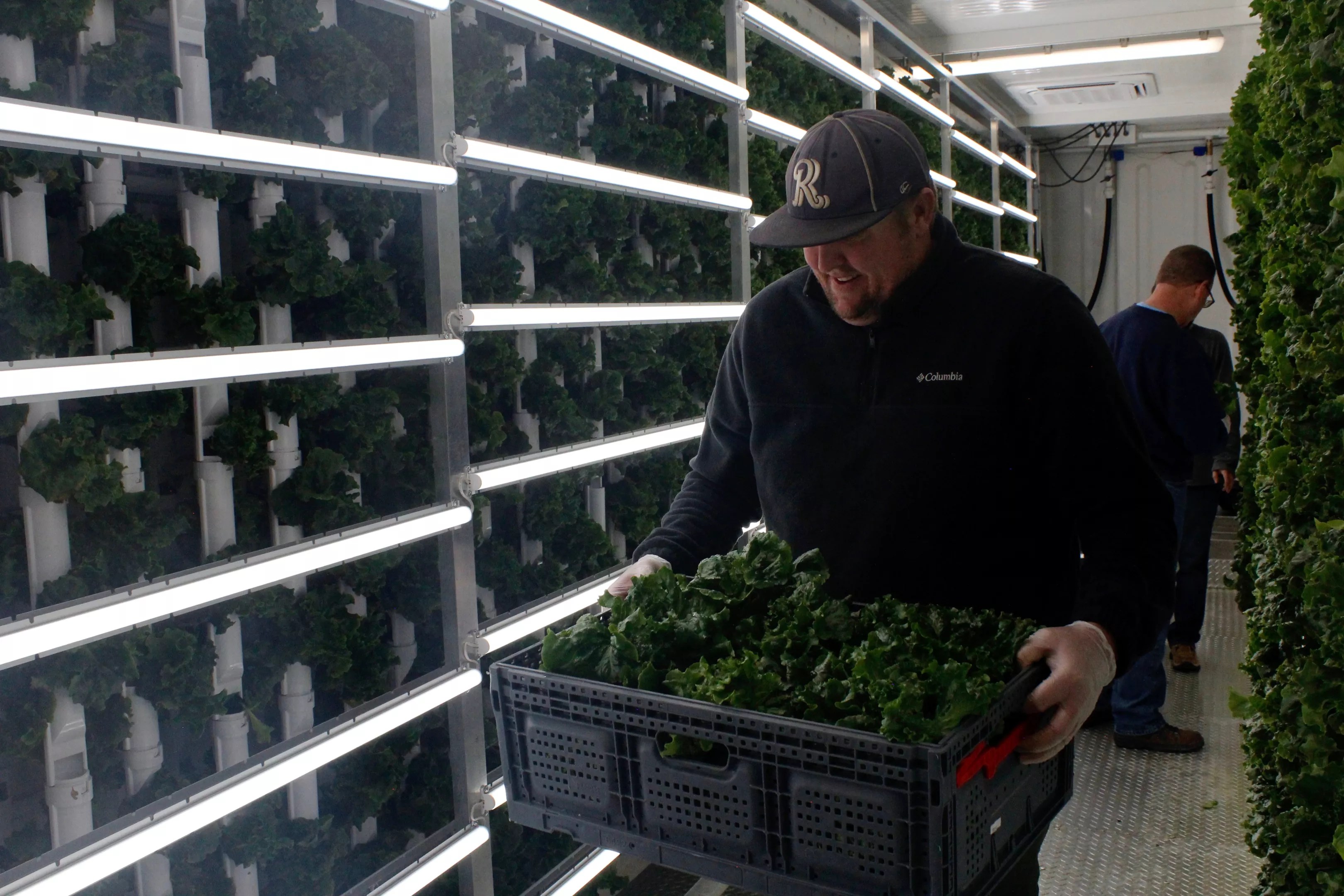
Courtesy of FarmBox Foods

Audio By Carbonatix
Denver-based FarmBox Foods is transforming shipping containers into farms. The repurposed steel boxes (which once held freight on trains, trucks and ships) get filled with living green walls and high-tech equipment to create 320-square-foot, fully automated grow spaces. Potential buyers often need to see the shipping container farms in person to truly picture the lush landscape, says FarmBox Foods Chief Operations Officer Jake Savageau. In one week, a FarmBox Vertical Hydroponic Farm (VHF) can grow up to 350 pounds of leafy greens, culinary herbs, hemp or cannabis, and the Gourmet Mushroom Farm (GMF) produces a weekly average of 400 pounds of culinary or medicinal mushrooms.
FarmBox Foods hopes the concept can help to address food insecurity in the face of climate change and population growth by bringing controlled growing environments to locations around the world.
Savageau started FarmBox Foods along with Tony English in 2017. Savageau, a contractor, and English, a real estate agent, originally wanted to build container houses, and English developed a hydroponic tube system to support gardens outside of the homes. However, early in their collaboration, they learned about container farms from a project at English’s daughter’s high school and realized that their tube technology could be expanded to support farms inside the containers instead.
As the business partners researched the idea, they became absorbed by the stark statistics chronicling hunger worldwide. For example, according to the United Nations, there are currently around 690 million hungry or undernourished people in the world. That’s almost 9 percent of the population – and if current trends continue, 840 million people are projected to experience ongoing hunger by 2030.
“The numbers are frightening,” Savageau relates. “We’re certainly not the only solution, but we’re a solution that can help fix [some] of the problem. We want to help the [food] industry get better.”

The Vertical Hydroponic Farm can grow up to to 350 pounds of leafy greens per week.
Courtesy of FarmBox Foods
Shipping container farms aren’t new, but FarmBox Foods has its own unique version. Right by the entrance of the VHF is a seedling table where the process begins. Nearly 7,000 seedlings can be planted before they’re transferred to growing tubes that line the container’s three movable walls. Most seedlings take around thirty to forty-five days to harvest, and they’re nurtured by a vertical hydroponic watering system that uses 90 percent less water than traditional farms, explains Savageau. All plants are harvested directly from the tubes in which they are grown.
The GMF is set up more like a lab, continues Savageau. A container is divided into four different rooms that lend themselves to the stages of inoculating and growing mushrooms. The system is meant for varieties such as lion’s mane, reishi, shiitake and oyster mushrooms.
In both types of FarmBox farms, LED lights help mimic sunlight, while the enclosed space allows growers to prevent pests and pathogens from infesting crops. Further, the containers use Agrowtek, smart technology that automatically adjusts humidity, air temperature, nutrient levels and water pH to maintain ideal growing conditions.
“It’s still farming.” Savageau says. “You have to get your hands dirty.” But he estimates that maintaining a VHF involves around fifteen hours of work per week, while the GMF takes about twenty to twenty-five hours of weekly labor.
“The VHF is not very complicated. You just have to keep things clean,” he continues. When customers purchase a FarmBox farm, they first receive online instruction, and then on-the-ground staff helps to explain the nuances of the farm in person. Afterward, new owners can sign up for support memberships to continue to receive the guidance they need.

The Gourmet Mushroom Farm produces culinary and medicinal mushrooms such as lion’s mane, reishi, shiitake and oyster varieties.
Courtesy of FarmBox Foods
FarmBox farms are intended for companies or organizations willing to make a substantial investment. The VHP costs $140,000 and the GMF costs $150,000, not including the price of training, shipping or freight. Further, it usually takes the VHP about two years to become profitable, while the GMF needs around a year and a half. But FarmBox Foods is committed to helping farmers and organizations overcome the financial barriers by offering grant resources and encouraging companies and individuals to donate to the farms.
The company currently works with a few individuals and large organizations such as Centura Health. But it’s also working with C Lazy U Ranch, a hundred-year-old dude ranch in Granby, and Grow Girl Organics, an urban farm in Arvada. All organizations share a mission to provide high-quality produce to their visitors and customers.
So far, FarmBox Foods has sold fewer than 100 farms, but the business currently has another 350 projects in the pipeline. Some containers are headed to Alaska, New Mexico, the East Coast, Jamaica and Tahiti. Savageau says that the containers are meant to provide the same service regardless of location. And while he and English know that their current models work, they’re also committed to continuing to innovate. They expect the VHP and GMF containers to be only their initial products.
“We’re trying to become a full-circle food company that can run off-grid and then can be deployed to help make [communities] self-reliant,” Savageau concludes.